
Alphabetical Menu
Chronological Menu
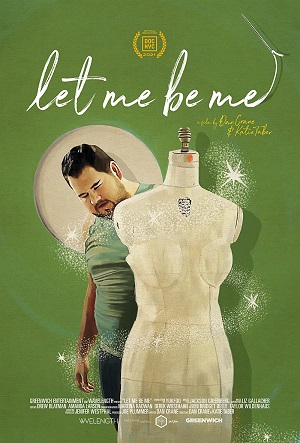 Big Gold Brick 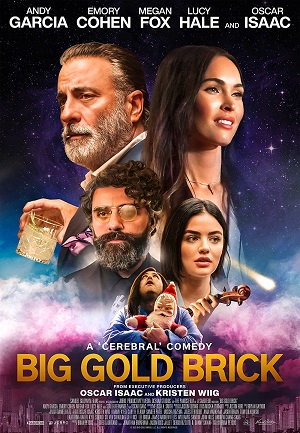 Samuel Liston (Emory Cohen), a struggling, depressed writer on the verge of suicide, gets hit by a car, leaving him unconscious with a serious head injury. The car's driver, Floyd (Andy Garcia), visits him at the hospital. When he wakes up, he offers to hire Samuel as his biographer while living with him and his wife, Jacqueline (Megan Fox), daughter, Lily (Lucy Hale), and son, Edward (Leonidas Castrounis). Samuel agrees to the job offer, but it turns out to be much more than he bargained for. Big Gold Brick begins as a tragedy before veering into a wild, outrageously funny and unashamedly bizarre ride. The screenplay by writer/director Brian Petsos has plenty of surprises up its sleeve which won't be spoiled here, but it's worth mentioning that Petsos does not shy away from going to dark territory. He also doesn't avoid confusing the audience, mindfucking them and withholding exposition to allow for some room for interpretation. What's happening to Samuel? Why is it happening? What are Floyd's motives? Can he be trusted? There's nothing wrong with confusion or mindfucks for that matter. Charlie Kaufman went a similar route with Being John Malkovich, Richard Kelly with Donnie Darko and Terry Gilliam with Brazil, Time Bandits and more. The audience knows just as much about what's going on as Samuel does, so they're not one step ahead or behind him. They're confused when he's confused which makes it easier to relate to what he goes through with Floyd. < br> Another part of what makes Big Gold Brick such a gripping and provocative ride is because Petsos blurs the line between fiction and reality, sanity and insanity. Samuel does seem insane in some scenes, but rational and relatively sane in others. The same can be said about Floyd. There's much more to him than meets the eye which makes him all the more interesting. Does Samuel represent Faust and Floyd represent Mephisto? Perhaps. Samuel is somewhat like an amalgam of Donnie in Donnie Darko and Craig Schwartz in Being John Malkovich (his hair looks similar, even). Is Floyd like a surrogate father to him? Perhaps, as well. There are no easy answers in Big Gold Brick. Much like in life itself, sometimes there are questions with no answers. Life began with chaos, after all, and there's chaos all around us. According to Chaos Theory, there's chaos within structure and structure within chaos. Big Gold Brick bravely embraces that chaos with aplomb. Emory Cohen gives one of the best performances of his career in a role that gives him a lot to do. He sinks his teeth into the role of Samuel and tackles the role's emotional complexities as well which is no easy task. He's just as compelling to watch as Jake Gyllenhaal is in Donnie Darko. He and Andy Garcia have great chemistry together which makes it easier to buy into the bizarre, unpredictable friendship between Samuel and Floyd. Leonidas Castrounis is also great as Floyd's rebellious son. Oscar Isaac has a cameo that's as funny in an offbeat way and as startling as the cameo of Charlie Sheen in Being John Malkovich. Pay close attention to the opening credits which have opening credits in a tiny font for a reason that becomes clearer later on. It's a wonderful way to give the audience a small taste or forewarning of the film's bizarreness. At a running time of 2 hours and 12 minutes, Big Gold Brick is a bold, wildly entertaining and provocative trip down the rabbit hole. It deserves to become a cult classic in the vein of Donnie Darko. 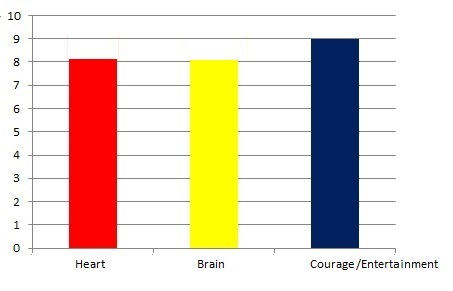 Butter  Marshall (Alex Kersting), a high school student bullied by classmates, suffers from obesity and low self esteem. He catfishes Anna (McKaley Miller), a girl from his school whom he pines for. She falls in love with the person she's texting, but she has no clue that he's the one texting her. Meanwhile, his parents, Marian (Mira Sorvino) and Frank (Brian Van Holt), take him to see Dr. Bean (Ravi Patel) to treat his obesity, but it doesn't work. He feels suicidal and decides to live-stream himself eating himself to death. Based on the novel by Erin Jade Lange, Butter serves as a vital wake-up call about the harmful effects of bullying and the importance of mental health, self worth, empathy and compassion. Marshall is still a child with a developing brain, especially the prefrontal cortex that's responsible for decision making. Like many teenagers, doesn't know what to do with his emotions and his issues with self worth in a shallow, materialistic society. He received his nickname "Butter" from classmates who fat-shamed him so his nickname stuck. Fat-shaming hurts. Words hurt. Writer/director Paul A. Kaufman shows genuine empathy toward Marshall by writing him as a complex human being, warts and all, and by not judging him for his faults. The audience gets to see Marshall in his private moments as he suffers tremendous emotional pain--a pain that can be worse than physical pain because it doesn't leave visible scars. He's blessed with loving parents who don't bully him, but, concurrently, they don't understand how depressed their son is. Perhaps he's too ashamed of himself to confide in them. It's easier for him to hide behind the anonymity of the internet where he catfishes Anna. If only he could meet someone like Maude from Harold and Maude. He and Harold have a lot in common on an emotional level. Writer/director Paul A Kaufman deserves praise for tackling the tough issues of bullying, suicide and depression, and also for making it more palatable with some humor which provides much-needed levity to counterbalance the heavy topics. Yes, the film gets dark, but not too dark, heavy-handed or emotionally devastating. The relationship between Marshall and Anna doesn't become cheesy even during the heartwarming, tender moments---this isn't a Nicholas Sparks' movie, after all. There's probably a darker version of Butter, although then it would be difficult to sit through or to recommend to teenagers like the film Mass. It's not quite as powerful as The Perks of Being a Wallflower, but it comes close enough. At least it's not as cringe-inducing or cloying as the musical Dear Evan Hansen. The emotional honesty in Butter, particularly during the un-Hollywood third act, is like a breath of fresh air. Alex Kersting gives a breakthrough performance as Marshall. He's the film's heart, mind and soul, so it's a testament to both the filmmaker and Kersting himself that the audience is able to peer into Marshall's inner life as he gradually learns how to have empathy for himself. Just because others dehumanize and bully him, doesn't mean that he should have to dehumanize and bully himself. He deserves to be happy, just like everyone. Finding that true happiness is easier said than done. It takes emotional maturity, honesty and wisdom along with introspection which Marshall also learns the importance of. To watch him grow, even if he has to learn the hard way, feels heartwarming. Kersting sees and treats Marshall as a human being which helps to make the film all the more engrossing. He has genuine warmth and charisma, and he's very brave for finding Marshall's emotional truth. Through thick and thin, the audience is there along with Marshall. His character arc is inspiring without being too preachy. To be fair, it veers close to preachiness occasionally, but it's forgivable because of how wise and honest the words are. McKaley Miller gives a moving performance that shines, and it's fortunate that Kaufman treats Anna as a human being as well because she's more than just a pretty girl; Anna has her own emotional battles that she's learning how to deal with. Mira Sorvino and Bran Van Holt are also terrific as they breathe life into the roles of Marshal's mother and father. They, like all human beings, are probably going through their own emotional struggles. At a running time of 1 hour and 50 minutes, Butter is a heartfelt, honest and inspirational journey. 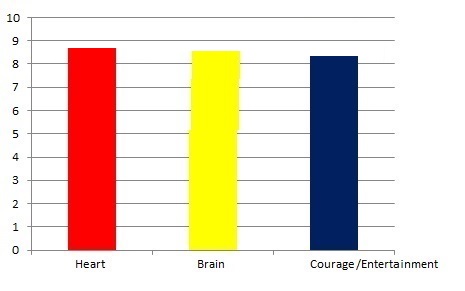 Cyrano 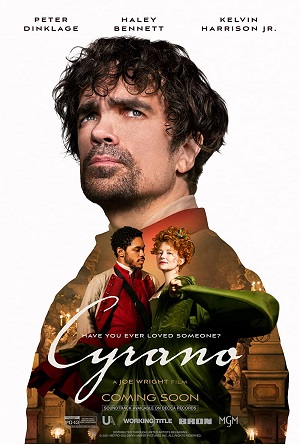
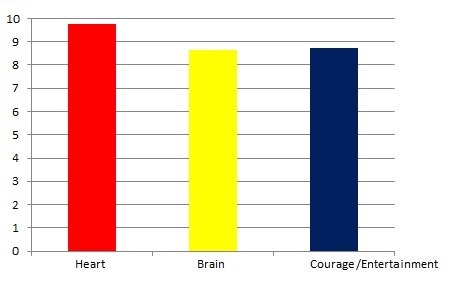 My Best Part 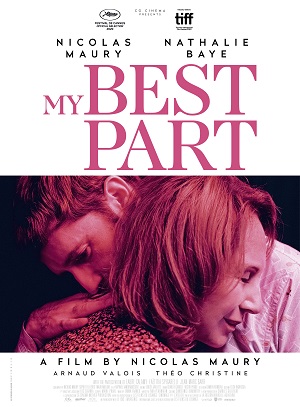 Jérémie Meyer (Nicolas Maury) struggles to find work as an actor. His boyfriend, Albert (Arnaud Valois), a veterinarian, breaks up with him and kicks him out of his apartment. Insecure, depressed, he hopes to regain his footing by moving into the countryside home of his divorced mother, Bernadette (Nathalie Baye) while he grieves the death of his father. Like life itself, My Best Part is hard to fit into a genre. At its core, though, it's a tragicomedy. Writer/director Nicolas Maury along with co-writers Maud Ameline and Sophie Fillieres have woven a perceptive, witty and poignant character study of a man who's lost in an ocean of sadness, anger, frustration and disappointments. His mother goes through her own innate struggles, so she's growing in a way, too. The screenplay treats Jérémie and Bernadette as human beings, not as caricatures. Bernadette isn't just a mother; she's an ex-wife and a human being who's still mourning the loss of someone she has spent years loving with all of her heart before divorcing him. To watch her and Jérémie connect on an emotional level is very poignant, even though they don't always get along. She's not a perfect mother and has her own flaws just like Jérémie does. She, too, feels lost and confused on the inside. Their conversations feel organic, but, most importantly, the way that their relationship evolves doesn't veer into schmaltz or contrivance. The filmmakers also do a great job of not judging either of them; it's ultimately up to the audience to judge them if they wish to. Between all of the tender drama, there's some comedy, i.e. the nuns that rescue Jérémie after he attempts to kill himself or Sylvie (Laure Calamy) an actress who goes on a long, awkwardly funny screaming rant. Yes, My Best Part does get dark and deals with complex issues, but it tackles them in a nuanced and gentle way while balancing the tragedy with humor like Hal Ashby does in Harold & Maude. Jérémie is in many ways like Harold at the beginning of Harold & Maude. He changes as he gradually awakens from his slumber and experiences epiphanies about life, love, death and happiness. My Best Part also excels at avoiding preachiness and hitting the audience in the head while remaining profound, unflinching and wise. Nicolas Maury gives a raw, brave performance as Jérémie. He portrays his emotional pains convincingly. Just as expected, Nathalie Baye is absolutely radiant as Jérémie's mother; she adds plenty of depth to the film even during the quieter moments. There's some interesting use of symbolism, i.e. Jérémie's dog gets sick and survives. Jérémie, too, has his own adversities to survive and overcome, but first he has to tackle them head-on like a "grown-up" which is easier said than done. What does it mean to be a grown-up anyway? Aren't we always growing up? My Best Part is wise, witty and poignant with just the right balance of humor and heartbreak. It would make for an interesting double feature with Albert Brooks' Mother and Xavier Dolan's I Killed My Mother or Mommy. 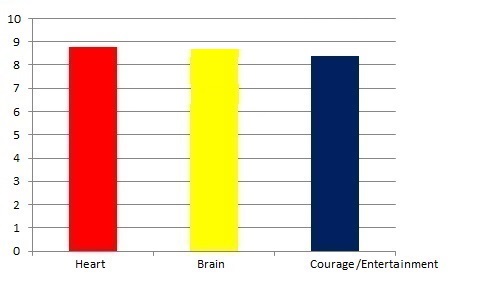 Studio 666 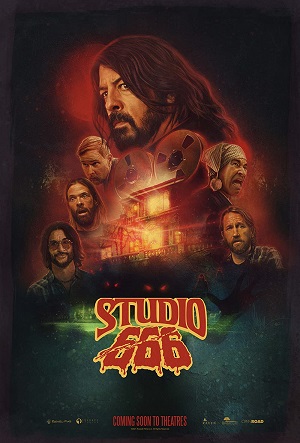 Dave Grohl, Rami Jaffee, Nate Mendel, Chris Shiftlett, Taylor Hawkins and Pat Smear, a.k.a. The Foo Fighters, have to make a 10th album. Their manager (Jeff Garlin) finds a mansion in Encino for them to get together to record the album. Little do they know that the mansion is haunted by evil, supernatural spirits. Studio 666 is a campy slice of mindless entertainment that pays homage to 80s and 70s horror comedies like The Evil Dead and House. Screenwriters Jeff Buhler and Rebecca Hughes open the film with a gory prologue that provides a small glimpse of the events to come for the Foo Fighters after they move into the mansion. Blending horror and comedy isn't an easy task, but Studio 666 manages to find that balance successfully for the most part. It's often silly, over-the-top and even occasionally campy, i.e. the scenes with a friendly neighbor (Whitney Cummings). Even the way she's introduced is funny in an offbeat sort of way. The backstory involving the supernatural entity is not very interesting or surprising, but that's okay because Studio 666 is a B-movie in every sense. The plot doesn't really matter and is easily forgettable; it's just an excuse to make the audience laugh at, or in some cases, with the characters. Will Forte briefly shows up as a delivery man who's a huge fan of the Foo Fighters. If all you want out of a horror comedy is outrageous, wickedly funny humor and plenty of gore, Studio 666 delivers the goods. The Foo Fighters have a lot of fun in their roles, and it shows. Even Jeff Garlin is delightfully zany and tongue-in-cheek as their manager. There are some wickedly funny, inventive kills with plenty of blood and guts, so this isn't a movie for those with a weak stomach. Studio 666 isn't not as gut-bustingly funny and brilliant as Shaun of the Dead, though, nor does it have much in terms of wit, but it's still nonetheless an amusing and guilty pleasure that's best experienced drunk or stoned with a group of friends. It's a lot more entertaining than the dull, tedious and sophomoric Scream 5. 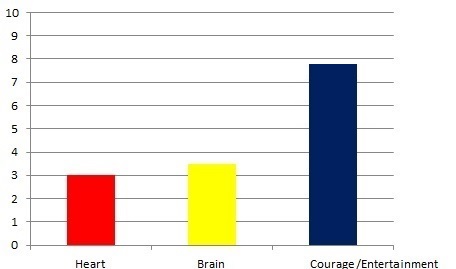 |